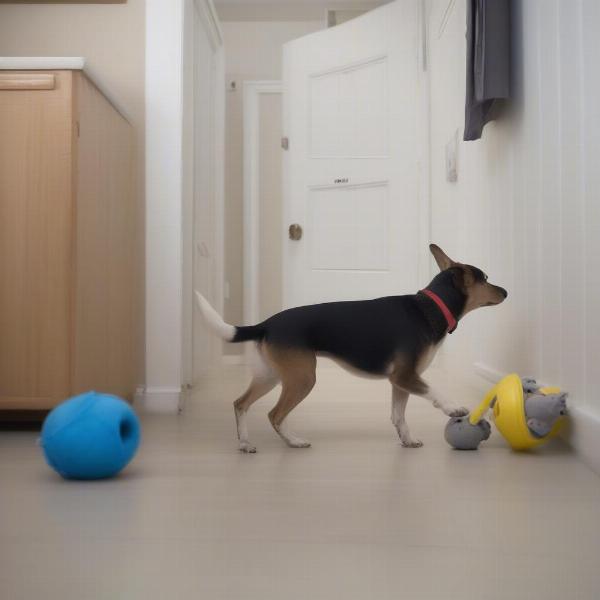A restless dog can be a frustrating experience for both the owner and the pet. Understanding the reasons behind your dog’s restlessness is crucial to addressing the issue and helping them find peace and comfort. This restlessness can manifest in many ways, from pacing and whining to excessive barking and destructive behavior. Let’s explore the potential causes and solutions for a dog restless and unable to relax.
Common Reasons for Restlessness in Dogs
Several factors can contribute to a dog restless and anxious. These range from medical conditions to environmental stressors and behavioral issues. Identifying the root cause is the first step toward a solution.
Medical Reasons for Restlessness
Sometimes, a dog restless and pacing might be experiencing underlying medical issues. Conditions such as pain, allergies, or even cognitive dysfunction can make it difficult for your dog to settle down. If your dog’s restlessness is accompanied by other symptoms, such as changes in appetite, lethargy, or vocalizations, it’s essential to consult a veterinarian for a proper diagnosis and treatment plan.
Environmental Factors and Stressors
Your dog’s environment plays a significant role in their overall well-being. A noisy or chaotic environment can be overwhelming, leading to a dog restless and unable to relax. Changes in routine, such as moving to a new home or the introduction of a new pet, can also cause stress and anxiety. Ensuring a calm and predictable environment can significantly reduce restlessness.
Behavioral Issues and Boredom
A dog restless and panting may simply be bored. Lack of mental and physical stimulation can lead to restlessness and destructive behaviors. Dogs need regular exercise, playtime, and mental enrichment to stay happy and balanced. Training and engaging activities can help channel their energy and reduce restlessness.
 A bored dog displaying restless behavior
A bored dog displaying restless behavior
Addressing Dog Restlessness: Practical Tips and Solutions
Once you’ve identified the potential cause of your dog’s restlessness, you can take steps to address the issue and help your furry friend find peace.
Veterinary Care for Medical Conditions
If a medical condition is suspected, prompt veterinary care is crucial. Your veterinarian can diagnose and treat the underlying issue, providing relief and improving your dog’s overall comfort.
Creating a Calm and Enriching Environment
Ensure your dog has a safe and comfortable space to relax. Minimize noise and distractions, especially during rest periods. Provide plenty of toys and opportunities for mental stimulation, such as puzzle toys or interactive games. A predictable routine can also help reduce anxiety and restlessness.
Exercise and Mental Stimulation for a Balanced Dog
Regular exercise is essential for a dog’s physical and mental health. Daily walks, playtime in the park, or engaging in dog sports can help burn off excess energy and reduce restlessness. dog restless and panting can be a sign of needing more exercise or having an underlying medical condition. Mental stimulation is equally important. Training sessions, puzzle toys, and interactive games can keep your dog engaged and prevent boredom.
Training and Behavior Modification Techniques
Training can be a valuable tool in managing restlessness. Teaching your dog basic commands, such as “stay” and “settle,” can help them learn to relax on cue. For more complex behavioral issues, consulting a certified dog trainer or behaviorist can provide tailored strategies. how to calm a restless dog at night can also involve establishing a calming bedtime routine.
Conclusion: Helping Your Dog Find Peace and Comfort
A dog restless and anxious can be a challenge, but with patience and understanding, you can help your canine companion find the peace and comfort they deserve. By addressing the underlying cause of the restlessness, whether it’s medical, environmental, or behavioral, you can significantly improve your dog’s quality of life. Remember to consult with a veterinarian or professional dog trainer for personalized guidance. why is my dog restless at night can often be due to anxiety or discomfort. senior dog restless and panting can be indicative of age-related discomfort or cognitive decline, so it’s especially important to consult a vet in these cases.
FAQ
- Why is my dog restless at night? This can be caused by anxiety, discomfort, or a need to go potty.
- How can I help my senior dog who is restless and panting? Consult a vet to rule out medical causes and consider pain management or anxiety medication.
- What are signs of restlessness in dogs? Pacing, whining, panting, inability to settle, destructive behavior.
- Is restlessness in dogs always a sign of a medical problem? No, it can also be due to boredom, anxiety, or environmental factors.
- How much exercise does a restless dog need? This depends on the breed and age, but generally, more exercise than a calm dog.
- Can training help with a restless dog? Yes, training can teach a dog to settle and relax on command.
- What if my dog is restless despite trying everything? Consult a vet or a certified dog trainer for further guidance.
ILM Dog is your go-to resource for all things dog-related. We offer expert advice on dog breeds, health, training, nutrition, grooming, and much more. From choosing the right breed to understanding your dog’s behavior, we are here to help you navigate the joys and challenges of dog ownership. We offer a range of services to help you and your furry friend live a happy and healthy life together. Whether you need guidance on puppy care, senior dog care, or anything in between, our team of experts is here to support you. Contact us at [email protected] or +44 20-3965-8624 for personalized advice and support. ILM Dog is committed to providing you with the most accurate and up-to-date information to ensure your dog receives the best possible care.